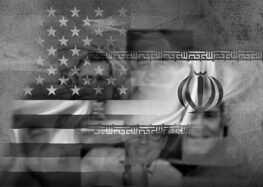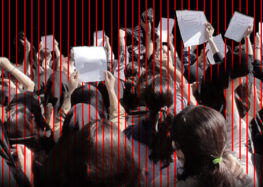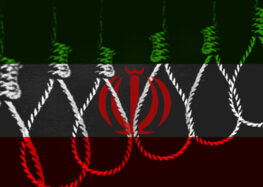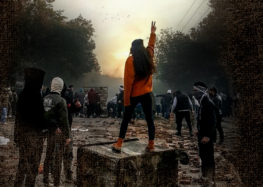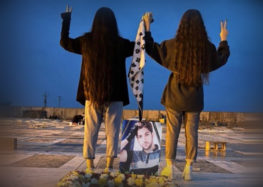Prioritizing Human Rights in Iran: A New U.S. Foreign Policy Approach
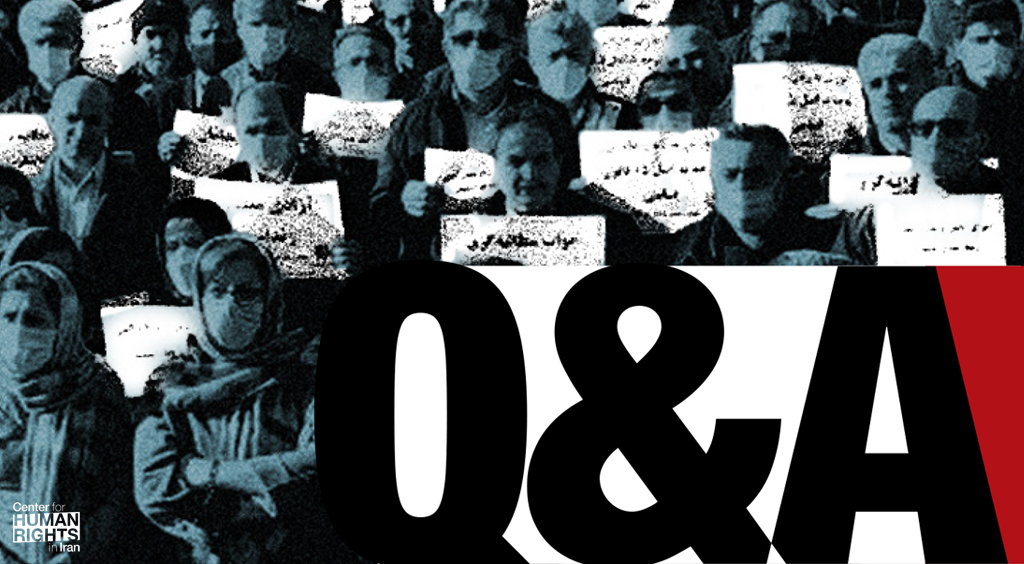 Q&A on Recommendations for the U.S. Government
Q&A on Recommendations for the U.S. Government
The Center for Human Rights in Iran’s (CHRI) new briefing, Human Rights in Iran and U.S. National Security Interests: A Path Forward for U.S. Foreign Policy Toward the Islamic Republic, lays out a U.S. foreign policy approach to Iran that affords human rights a central role, equal in importance to and pursued on par with other political, economic and strategic policy streams and objectives.
This approach would be focused on the U.S. government recognizing and amplifying the voices of civil society in Iran—voices that are largely unsupportive of many of the Islamic Republic’s destabilizing regional activities, yet are unable to safely express dissent—and on U.S. leadership in forging a coordinated and robust international response to rights abuses in Iran. Policies would include increased recognition of dissidents and their issues of concern, more rigorous defense of peaceful protest, and strengthened international human rights mechanisms.
We argue that such an approach would serve U.S. national security interests far more effectively than other approaches such as economic pressure or military action, which have either proved ineffectual or have been discredited, as over the long term, amplifying these voices has more potential for influencing Iranian state behavior.
Download This Q&A in PDF Format
Following are questions that government officials, experts, and journalists have posed to us regarding our briefing and policy recommendations, followed by CHRI’s responses.
- Would prioritizing the promotion of human rights in Iran be used by some to advance the argument for military intervention in Iran and regime change?
Unfortunately, the cause of human rights has been used by some for political purposes, including for military intervention and regime change. There will always be those who take bits of others’ arguments to advance their own positions. Yet we do not believe that promoting human rights in any way advances the argument for regime change or military intervention in Iran.
Human rights are universal principles that should be promoted in all country contexts, friends and foes alike, and which are actually integral to maintaining a peaceful international order. And CHRI is explicit in its opposition to all interventionist and military actions against Iran. We firmly believe that the political trajectory of the Islamic Republic should be decided by the people of Iran and that is exactly why the main thrust of our argument supports the right of those people to express their views and their dissent without fear of persecution and prosecution.
- Will advocating for human rights in Iran harm prospects for a nuclear deal with the Islamic Republic?
CHRI strongly rejects the view that promoting human rights will harm prospects for a nuclear deal. This is a specious argument that has no validity and its use has effectively given the authorities in Iran a green light to continue to engage in the most egregious and widespread rights abuses. There have been many examples of the United States pursuing multiple policy tracks with other countries successfully. Indeed, during the Cold War, the U.S. advanced major armament deals with the Soviet Union whilst Washington pursued robust and consistent support for human rights and dissidents in the Soviet Union.
CHRI unequivocally supports peaceful conflict resolution between all parties. However, we maintain that promoting human rights simultaneously and with equal rigor alongside other policy streams is not only a viable foreign policy approach, it helps to advance U.S. strategic interests vis-a-vis the Islamic Republic and the broader region.
- Will supporting the voices of dissidents harm the very people you hope to help?
We do not believe that supporting the voices of dissidents and the concerns they raise will harm the people we seek to help. In fact, dissidents, activists, human rights lawyers and many other members of civil society from all backgrounds, professions, socioeconomic classes and provinces throughout Iran have consistently expressed to CHRI a clear and strong desire for international support for human rights in Iran, including from the U.S. They want the international community to speak out on their behalf, they urge recognition of their voices and of the issues of concern that they raise, and they seek global attention to their persecution and prosecution. They believe such recognition would advance their causes and have repeatedly expressed to us their dismay that the global community will often speak out strongly for dissidents in China and other countries but remains largely silent on the persecuted human rights defenders in Iran. Credible independent polling has also shown strong societal support in Iran for international support for human rights in the country.
Human rights defenders in Iran are going to be targeted for state persecution regardless of whether the international community weighs in on their behalf. Communicating to the Islamic Republic in a unified, multilateral manner that there will be clear, tangible and meaningful political and diplomatic costs to persecuting human rights defenders can only help their causes.
- The U.S. has voiced support for human rights in Iran before and it has not made any difference. Is a different outcome possible?
Despite proclamations to the contrary, U.S. support for human rights in Iran has been tepid, sporadic and in the end, inconsequential. We are not calling for occasional, generic lip service regarding the importance of human rights, or more reports passively documenting rights abuses in the Islamic Republic. We are calling for meaningful, rigorous prioritization of rights issues in Iran by the U.S., which must include the consistent recognition and amplification of dissidents and the specific concerns they raise, and robust U.S. leadership on the international stage to forge and galvanize multilateral coalitions to support the voices and rights of Iranian civil society.
The U.S. and its partners must weigh in on Iranians’ right to freedom of expression, association and assembly, their right to dissent, and their right to peaceful protest, and they must be willing to impose meaningful political and diplomatic costs for abuses. This must be done consistently and sustained over the long term, with clear signaling that this is of equal importance to other policy streams and objectives. This has not been done by any U.S. administration, past or present–either during the Shah’s reign or under the Islamic Republic–and we believe that this kind of leadership by the United States, whose political, economic and soft power is still unequaled by any other country, would make a difference.
- The Islamic Republic is impervious to change; there have been protests for decades in the country and the government has always been able to crush them. It will just keep jailing–or killing–dissidents. Why do you think anything could change?
It is important to recognize that any improvement in Iran’s human rights situation would take time and would likely be incremental. That is why these policies must be consistently maintained over the long term. Yet we believe change is possible for many reasons.
First, the historical record of U.S. support for human rights in other country contexts speaks to its potential impact over time. We saw this with the Soviet Union, when the U.S. consistently prioritized human rights and supported dissident voices in the country even while it was conducting negotiations with the Soviets on multiple streams. This was an integral component of the U.S.’s eventual victory in the war of ideas during the Cold War. U.S. support for human rights has made a difference in other countries’ political trajectories too, such as South Korea and Taiwan, and there is no reason to believe that it could not have an impact over time in the Iranian context.
Second, there have indeed been protests in Iran for decades, all of which have been eventually suppressed, and the Islamic Republic will likely be able to continue to suppress protests for some time. Yet dissent in Iran is changing; protests have been increasing in frequency and taking place across many sectors of society, and now routinely occur in areas that were previously strong bases of support for the government. The nature of dissent has also shifted, with protesters now routinely voicing a fundamental rejection of the Islamic Republic’s political and economic order. The Iranian authorities have registered rising concern over their ability to contain this intensifying dissent, as seen in leaked comments by IRGC officials that are detailed in our briefing.
Third, also detailed in our briefing, the Islamic Republic has demonstrated notable pragmatism in the past when under pressure, and a willingness to revisit its policies when necessary. While the country’s security forces may crack down even harsher in the near term, if dissent and protest persist, the government may well assess that certain policies must be adjusted.
Lastly, there are no real alternatives. Supporting civil society so that it can express dissent and disapproval of state policies has the best chance of influencing Iranian state behavior, as opposed to tactics like economic pressure, which the authorities in Iran have shown they are willing to withstand, or military action, which has been widely disqualified as a viable option.
- How can the U.S. effectively promote human rights in Iran when U.S. allies like Saudi Arabia and Egypt are also serious human rights abusers?
CHRI agrees that the U.S. can only promote human rights in Iran effectively if it does so consistently throughout the region, for friends and foes alike, and our policy briefing calls for this. Such a policy would be very much in sync with longstanding U.S. principles, and would only serve to expand the U.S.’s soft power and global leadership. Our position is clear: to promote human rights more effectively in Iran, the U.S. must apply the same principles to other countries in the Middle East. When the U.S. ignores human rights abuses by other autocratic and repressive governments, it damages its credibility, provides the Iranian authorities with the opportunity to deflect criticism of its record, and undermines U.S. efforts to promote human rights in Iran.


